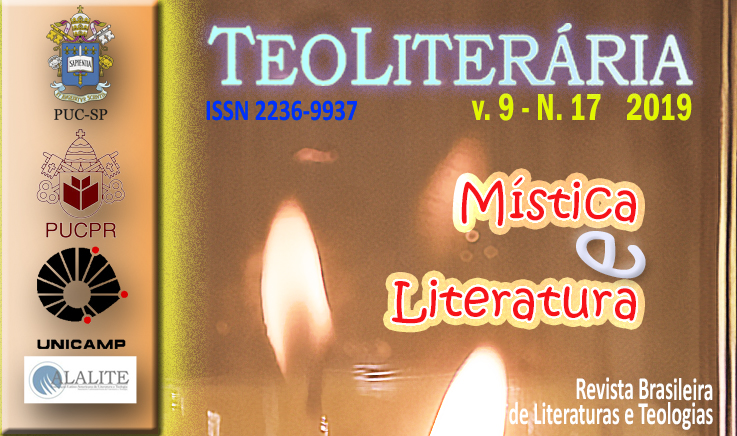Análise retórico-pragmática do uso das emoções em 2Cor 11,1-15.
DOI:
https://doi.org/10.19143/2236-9937.2019v9n17p307-336Keywords:
Paulo, Retórica, Pragmática, Emoções, Coríntios, EvangelhoAbstract
Apesar da sua particularidade, por ser considerada Palavra de Deus, a Bíblia se apresenta como uma comunicação literária, concebida para perdurar e transmitir uma mensagem ao leitor. A partir desta concepção, a crítica literária, com metodologias e abordagens diferentes, tem sido aplicada ao texto bíblico e, com isso, favorecido a aproximação hermenêutica do leitor atual à mensagem do texto. Tal crítica considera as convenções literárias que dão forma ao texto (narração, poesia, carta), a sua perspectiva (retórica, pragmática, sapiencial, histórica) e a importância do contexto imediato (seção) e amplo (livro, carta), para a compreensão dos fragmentos. Este artigo, propõe uma análise retórico-pragmática de 2Cor 11,1-15, apoiada na Retórica de Aristóteles, com o objetivo de identificar as estratégias literárias usadas pelo autor, a partir do emprego de algumas emoções explicitas e implícitas. Estas estratégias visam promover uma mudança cognitiva nos seus destinatários e uma adesão mais convicta ao evangelho. Para isto, Paulo se expõe diretamente e propõe um horizonte reflexivo, cuja representação vai além das acusações que sofreu. A identificação das estratégias literárias faz parte da cooperação ativa à qual o leitor é convocado a atuar na leitura do texto.References
ALETTI, Jean-Noel. Paul et la rhétorique. Etat de la question e propositions de méthode. In Jacques Schlosser (Org.). Paul de Tarse. Paris: Cerf, 1996: 27-50.
ANDERSON Jr, R. Dean. Glossary of Greek Rhetorical Terms connected to Methods of Argumentation, Figures and Tropes from Anaximenes to Quintilian. Leuven: Peeters, 2000.
ARISTOTELES. Art of Rhetoric. Tradução de John Henry Freese. Cambridge; London: Harvard University Press, 2006.
BAUER, Walter; ARNDT, William F.; GINGRICH, F. Wilbur. A Greek-English Lexicon of the New Testament. Chicago; London: The University of Chicago Press, 1979.
BAZZANELLA, Carla. Linguistica e Pragmatica del Linguaggio: Un’introduzione. Roma; Bari: Laterza, 2008.
BLASS, Friedrich; DEBRUNNER, Albert. Grammatica del greco del Nuovo Testamento. Tradução de Umberto Mattioli e Giordana Pisi. Brescia: Paideia, 1997.
BROWN, Jeannine K. Scripture as Communication: Introducing Biblical Hermeneutics. Grand Rapids: Backer Academic, 2007.
DASCAL, Marcelo. Interpretação e compreensão. São Leopoldo: Editora Unisinos, 2005.
DUMONT, Emmanuel. La dialectique de l'Evangile et de la rhétorique chez saint Paul. Nouvelle Revue Théologique, vol. 125, n. 3, 2003 : 374-386.
FIORIN, José Luiz. Pragmática. In idem (Org). Introdução à Linguística: II. Princípios de análise. Editora Contexto: São Paulo, 2016: 166-167.
GERBER, Christine. Familie als Bildspender. In SCHERBERICH, Klaus (Org.). Neues Testament und Antike Kultur. Band 2: Familie, Geselschaft, Wirtschaft. Götingen: Neuerkirchen; Vandenhoeck & Ruprecht, 2011: 48-52.
GRILLI, Massimo. Interpretazione e azione: L’istanza pragmatica del testo biblico. In GRILLI, Massimo; GUIDI, Maurizio; OBARA, Elzbieta M. Cinisello Balsamo: GBPress; Edizioni San Paolo, 11-46.
KENNEDY, GEORGE. A. New Testament Interpretation through Rhetorical Criticism. Chapel Hill: The University of Carolina Press, 1984.
KLAUCK, Hans-Josef. Die Antike Briefliteratur und das Neue Testament. Ein Lehr und Arbeitsbuch. Paderborn; München; Wien; Zürich: Schöningh, 1998.
KONSTAN, David. The Emotions of the Ancient Greeks: Studies in Aristotle and Classical Literature. Toronto: University of Toronto Press, 2006.
LAMBRECHT, Jan. Second Corinthians. Collegeville: Liturgical Press, 1999.
LAUSBERG, Heinrich. Handbuch der Literarischen Rhetorik: Eine Gundlegung der Literarturwissenschaft. Stuttgart: Franz Steiner VErlag, 1990.
LIDELL, Henry G.; SCOTT, Robert. A Greek–English Lexicon. Oxford: Claredon Press, 1996.
LONG, Frederick J. Ancient Rhetoric and Paul’s Apology: The Compositional Unity of 2 Corinthians. Cambridge: Cambridge University Press, 2004.
MAGALHÃES, Antônio Carlos de Melo. A Bíblia na Crítica Literária recente. Revista Brasileira de Literaturas e Teologia – Teoliterária, vol. 2, n. 4, 2012: 133-143.
MEY, Jacob L. Literary Pragmatics. Concise Encyclopedia of Pragmatics. Amsterdam, Boston: Elsevier, 2009: 549-554.
MEYER, Michel. Prefácio. In ARISTOTELES. Retórica das Paixões. Tradução de Isis Borges B. da Fonseca. São Paulo: Martins Fontes, 2000: XVII-LI.
PERELMAN, Chaïm; OLBRRECHTS-TYTECA, Lucie. Trattato dell’argomentazione. La nuova retorica. Tradução de Carla Schick. Torino: Einaudi, 1985.
PONTIFÍCIA COMISSÃO BÍBLICA. A interpretação da Bíblia na Igreja. In Documentos sobre a Bíblia e sua interpretação. São Paulo: Paulus, 2005, p. 184-276.
QUINTILIANO, Marco Fabio. L’instituzione Oratoria. Vol. I. Tradução de Piero Pecchiura. Torino: Utet, 2003.
REED, Jeffrey T. The Cohesiveness of Discourse. In PORTER, Stanley E.; REED, Jeffrey T. (Org.). Discourses Analysis and the New Testament: Approaches and Results. Sheffield: Sheffield Academic Press, 1999: 28-46.
ROMANELLO, Stefano. La dimensione pragmatica nell’epistolario paolino: l’esempio di Fil 1,27–2,4. In BARBI, Augusto; ROMANELLO, Stefano (Org.). La narrazione nella e della Bibbia. Padova: Edizione Messaggero Padova, 2012: 61-86.
SCHLIER, Heinrich. anechō. Grande Lessico del Nuovo Testamento. I. Brescia: Paideia, 1965: 965-968.
SEGRE, Cesare. Avviamento all’analisi del testo letterario. Torino: Einaudi, 1999.
STANLEY, Christopher D. Arguing with Scripture: The Rhetorical of Quotations in the Letters of Paul. New York; London: T&T Clark, 2004.
STUMPFF, A. zēlos, Grande Lessico del Nuovo Testamento. Vol. III. Brescia: Paideia, 1967: 1486-1518.
WATSON, N. Paul and the Boasting. In SAMPLEY, J. Paul (Org.). Paul in the Greco-Roman World: A Handbook. Harrisburg; London; New York: Bloomsbury T&T Clark, 2003, 77-100.
WELBORN, L. L. Paul’s Appeal to the Emotions. Journal for the Studies of the New Testament, vol. 82, 2001: 54-57.
ZERWICK, Maximiliano. El griego del Nuevo Testamento. Tradução de Alfonso de la Fuente Adame. Navarra: Verbo Divino, 1997.
Published
How to Cite
Issue
Section
License
Copyright (c) 2019 Teoliteraria - Journal of Literatures and Theologies (On Line) ISSN 2236-9937

This work is licensed under a Creative Commons Attribution 4.0 International License.
TeoLiteraria – Journal of Literatures and Theologies owns the copyright of all published material. The whole reproduction of the articles of this Journal in other publications or for any other purpose, by any means, requires a written permission of the editor of this journal. Partial reproductions of articles (abstracts, more than 500 words text, tables, figures and other illustrations) must have a permission written by the publisher and the authors.

